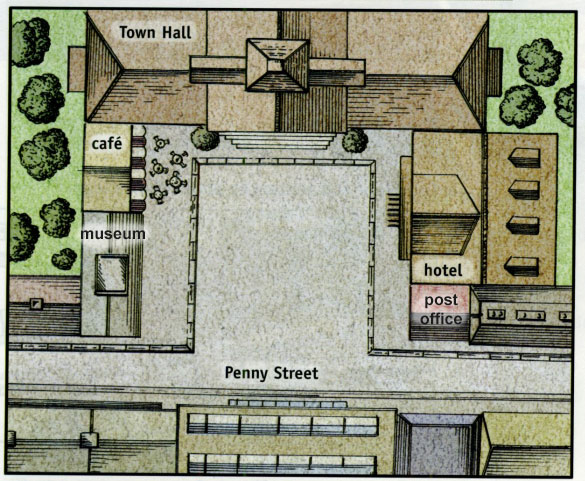Conversation
In this lesson, you will learn to describe locations of a the buildings in your city. When describing locations, we often use some prepositions of place. Listen to the conversation below, pay attention to the expressions and phrases about describing locations.
See the postcard the speaker mentions in the conversation.
- The post office is on the corner next to the hotel.
- The museum is opposite the hotel.
- The cafe is between the museum and the Town Hall.
Language Notes:
Useful phrases to describe locations
- There’s …
There’s a post office next to the police station. - There’re …
There’re two big buildings on the corner. - It’s called …
It’s called the Town market.
Useful prepositions to describe the locations of buildings, parks, lakes, hospital, schools…
- on the corner (of)
- opposite
- next to
- between
- at the end of
- in front of
- on the left/right (of)
- behind
Examples
- The police station is on the corner of the Main Street.
- The post office is opposite the lake.
- The school is next to the hospital
- There’s a fashion shop between two tall buildings.
- There are two sport shops in front of the stadium.
- On the left of the City Hall is the kindergarten.
- The bus station is behind the train station.
Learn more:
Exercise
Listen to the conversation again and choose the correct answer.
[rapid_quiz question=”What is the name of the square?” answer=”Town Hall Square” options=”Market Square|Town Hall Square” notes=””]
[rapid_quiz question=”When is the market?” answer=”Every Wednesday” options=”Every Wednesday|Every Thursday” notes=””]
[rapid_quiz question=”What happens in the square once a year?” answer=”a French market” options=”a music festival|a French market” notes=””]
[rapid_quiz question=”What is the name of the Hotel?” answer=”The Angel Hotel” options=”The Lancaster Hotel|The Angel Hotel” notes=””]
[rapid_quiz question=”What is the hotel cellar?” answer=”a club” options=”a club|a hairdresser’s” notes=””]
[rapid_quiz question=”Which shops does the speaker mention?” answer=”clothes shops” options=”book shops|clothes shops” notes=””]

I don’t know if it’s just me or if perhaps everybody else encountering problems with your blog.
It seems like some of the written text within your content are running off the screen. Can someone else please comment and let me know if this is happening
to them too? This could be a problem with my internet browser because I’ve had this happen before.
Thank you